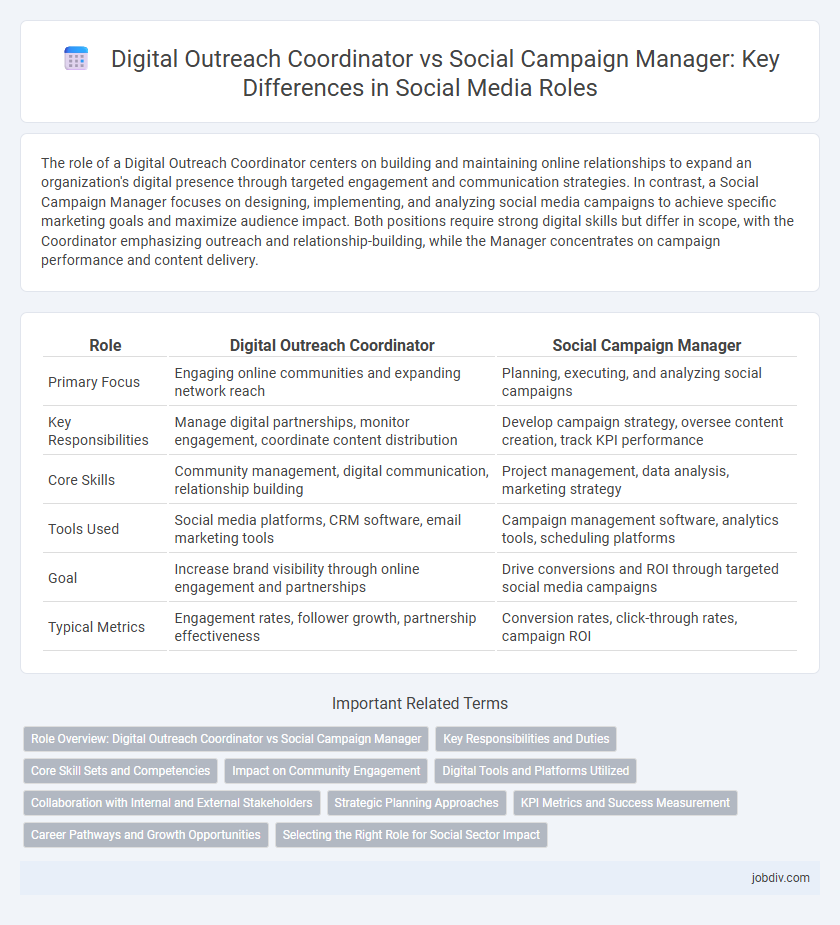The role of a Digital Outreach Coordinator centers on building and maintaining online relationships to expand an organization's digital presence through targeted engagement and communication strategies. In contrast, a Social Campaign Manager focuses on designing, implementing, and analyzing social media campaigns to achieve specific marketing goals and maximize audience impact. Both positions require strong digital skills but differ in scope, with the Coordinator emphasizing outreach and relationship-building, while the Manager concentrates on campaign performance and content delivery.
Table of Comparison
| Role | Digital Outreach Coordinator | Social Campaign Manager |
|---|---|---|
| Primary Focus | Engaging online communities and expanding network reach | Planning, executing, and analyzing social campaigns |
| Key Responsibilities | Manage digital partnerships, monitor engagement, coordinate content distribution | Develop campaign strategy, oversee content creation, track KPI performance |
| Core Skills | Community management, digital communication, relationship building | Project management, data analysis, marketing strategy |
| Tools Used | Social media platforms, CRM software, email marketing tools | Campaign management software, analytics tools, scheduling platforms |
| Goal | Increase brand visibility through online engagement and partnerships | Drive conversions and ROI through targeted social media campaigns |
| Typical Metrics | Engagement rates, follower growth, partnership effectiveness | Conversion rates, click-through rates, campaign ROI |
Role Overview: Digital Outreach Coordinator vs Social Campaign Manager
A Digital Outreach Coordinator specializes in building online relationships and expanding engagement through targeted communication strategies across social media platforms, email, and community forums. A Social Campaign Manager focuses on designing, executing, and analyzing multi-channel marketing campaigns to drive brand awareness and consumer action. Both roles require expertise in digital tools, audience segmentation, and performance metrics, but the Outreach Coordinator emphasizes direct interaction and community growth, while the Campaign Manager centers on strategic promotion and measurable campaign outcomes.
Key Responsibilities and Duties
A Digital Outreach Coordinator primarily manages online engagement strategies, develops targeted content, and leverages social media platforms to increase brand awareness and community interaction. In contrast, a Social Campaign Manager oversees the planning, execution, and analysis of multi-channel social marketing campaigns, optimizing ROI and ensuring alignment with overall business goals. Both roles require strong communication skills and data-driven decision-making but differ in their focus on daily community management versus strategic campaign delivery.
Core Skill Sets and Competencies
Digital Outreach Coordinators excel in digital communication channels, content creation, and audience engagement analytics, ensuring targeted reach and responsiveness. Social Campaign Managers specialize in strategic planning, budget management, performance metrics analysis, and coordinating multi-platform campaigns for cohesive brand messaging. Core skills for both roles include data-driven decision-making, proficiency with social media tools, and the ability to adapt messaging for diverse online communities.
Impact on Community Engagement
A Digital Outreach Coordinator leverages targeted digital strategies and data analytics to enhance real-time community interaction across social media platforms, fostering direct and personalized connections. In contrast, a Social Campaign Manager designs and executes broad, goal-driven campaigns that mobilize large audiences and amplify brand messaging for sustained community involvement. Both roles significantly boost community engagement, but the Digital Outreach Coordinator emphasizes immediate, ongoing participation while the Social Campaign Manager focuses on strategic, large-scale impact.
Digital Tools and Platforms Utilized
Digital Outreach Coordinators primarily leverage email marketing platforms, social media management tools like Hootsuite or Buffer, and CRM software to engage digital audiences and manage online relationships. Social Campaign Managers focus extensively on data analytics tools such as Google Analytics and Facebook Insights to optimize campaign performance across platforms like Instagram, Twitter, and LinkedIn. Both roles utilize content management systems (CMS) but differ in the emphasis on direct audience engagement versus strategic campaign analysis.
Collaboration with Internal and External Stakeholders
Digital Outreach Coordinators excel in fostering collaboration by managing communications between internal teams and external partners to amplify digital presence and engagement. Social Campaign Managers focus on coordinating cross-functional teams and external vendors to design and execute integrated social media campaigns that drive brand awareness and user interaction. Both roles require strategic partnership development, but outreach coordinators emphasize ongoing stakeholder engagement while campaign managers prioritize campaign-specific collaboration.
Strategic Planning Approaches
Digital Outreach Coordinators emphasize targeted audience engagement through data-driven insights and personalized content distribution across multiple digital platforms. Social Campaign Managers focus on holistic campaign strategies, integrating cross-channel messaging and performance metrics to optimize reach and impact. Both roles require strategic planning, yet Coordinators prioritize micro-level audience segmentation while Campaign Managers drive macro-level campaign alignment and brand consistency.
KPI Metrics and Success Measurement
Digital Outreach Coordinators focus on engagement metrics such as click-through rates (CTR), conversion rates, and audience reach to optimize community interaction and digital presence. Social Campaign Managers prioritize tracking campaign-specific KPIs like impressions, social shares, follower growth, and return on ad spend (ROAS) to measure overall campaign performance and brand impact. Both roles emphasize data-driven strategies but differ in scope, with Outreach Coordinators targeting organic growth and Campaign Managers managing paid social media efforts.
Career Pathways and Growth Opportunities
A Digital Outreach Coordinator typically focuses on community engagement and expanding online presence through targeted communication strategies, providing foundational skills in digital marketing and analytics. A Social Campaign Manager often oversees larger-scale social media campaigns, managing budgets and cross-functional teams, which cultivates advanced project management and strategic planning expertise. Career growth for a Digital Outreach Coordinator can lead to roles in social media management or content strategy, while Social Campaign Managers may progress into senior marketing leadership positions or specialize in digital advertising analytics.
Selecting the Right Role for Social Sector Impact
Digital Outreach Coordinators specialize in leveraging online platforms and data analytics to enhance community engagement and expand social cause visibility, making them ideal for organizations prioritizing digital growth. Social Campaign Managers focus on strategizing, executing, and measuring integrated social campaigns, driving targeted advocacy and fundraising efforts across multiple channels. Selecting the right role depends on whether your social sector impact relies more on digital engagement metrics or comprehensive campaign management to mobilize support and resources.
Digital Outreach Coordinator vs Social Campaign Manager Infographic

 jobdiv.com
jobdiv.com